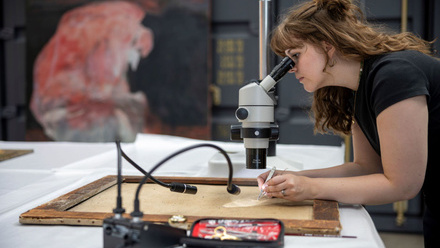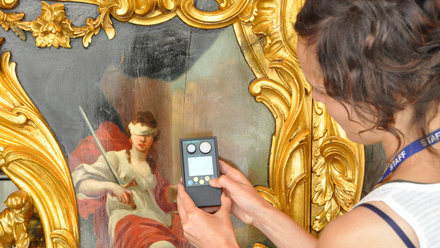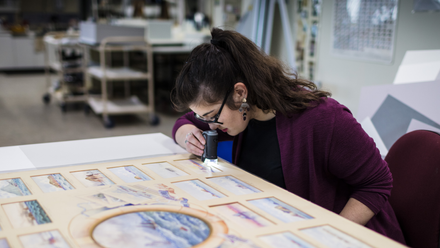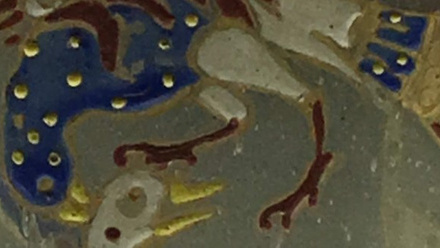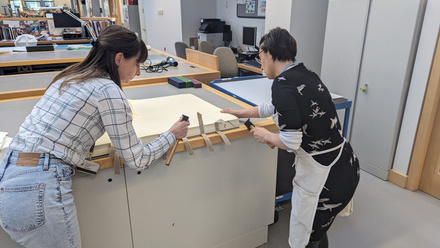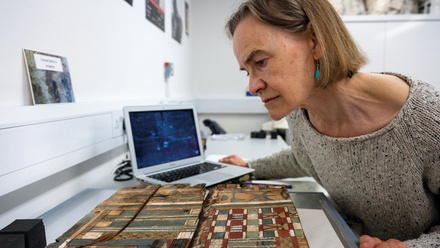Fair Museum Jobs is a voluntary collective that works to champion better standards of museum employment, promoting equality, inclusion, and transparency in recruitment and terms of employment. During the week of November 23rd, the team of 6 delivered a punishing 7-day programme of 66 online events covering topics ranging from parental leave to what it is like to be a museum freelancer.
I participated in a panel discussion called What it’s like to work in Conservation and Collections Care, alongside conservators Julie Bon ACR, Lorraine Finch ACR, The C Word Podcast presenter Jenny Mathiasson, and Canadian emerging conservator Raene Poisson. Our chair was Louise McAward-White of Fair Museum Jobs.
An interesting point that came up was that none of us knew that conservation was a career option until we were already at university
Education and career paths
We discussed a range of aspects of conservation, raised by both Louise and the audience. Career paths, courses of study, positives and negatives, favourite projects, the job market, private practice and institutional employment, and accreditation.
The panel worked well, with an open, frank, and honest discussion between participants. An interesting point that came up was that none of us knew that conservation was a career option until we were already at university. This led me to reflect afterwards on how we might work as a sector to promote conservation studies to school students.
The audience was keen to understand if further education was necessary in order to work in conservation, as all panellists had followed this route. Lorraine highlighted the Conservation Technician Qualification, and Julie spoke about paid internships, but we were open about the competitiveness of the job market and that entry level opportunities are still rare. Raene shared her experience as an emerging conservator, moving across Canada for short term contracts and returning to stay with her parents between jobs.
a summer job as a hospital cleaner using industrial floor buffers helped me to get my first preventive conservation job
Specialisms and skills
An audience member posed a question about which specialism has the greatest market need at present, as they had heard that painting conservation was oversubscribed. None of us could answer this, as we could only speak from our own anecdotal experience, but we agreed that it would be interesting to know if there is hard data that could shed light on this. [Ed: Icon plans to carry out the Labour Market Intelligence survey that was postponed last year due to Covid-19 in early 2021.] We explained that the sector is very aware of not wanting to flood the market with too many graduates in specific disciplines, and that course intakes are limited partly for this reason.
Skills and attributes were brought up, and the panel shared the variety of useful skills we have gained from work, study, and pastimes. Jenny explained how useful her crafting abilities can be in her work life; I noted that a summer job as a hospital cleaner using industrial floor buffers helped me to get my first preventive conservation job. We discussed the personality types that we have observed being attracted to the profession: attention to detail, an enjoyment of art and science, curiosity, patience, and problem solving.
one positive by-product of the Covid-19 pandemic is the democratisation of training and knowledge sharing
Continuing Professional Development
The importance of continued professional development (CPD) and maintaining a current knowledge of sector practice was raised. While the panel agreed it was necessary, the limitations of travel, time, and cost of attending training events and conferences were acknowledged as significant barriers.
Raene pointed out that one positive by-product of the Covid-19 pandemic is the democratisation of training and knowledge sharing, as conferences have moved online and are often recorded so they can be accessed worldwide at any time. While we generally found networking to be less effective online (thus far), we all hoped that the lessons of accessibility continue in future, given the far greater reach of knowledge throughout the sector.
We certainly found value in the online panel format as a means of sharing ideas and interactively asking and answering questions. Icon Scotland’s annual Plenderleith lecture also adopted this format for its second half, receiving positive feedback from the audience. It appears therefore that there is scope to develop this type of online event across the sector.
we all agreed that the work is enjoyable and rewarding
Pros and cons
When we turned to positives and negatives, there was lively discussion about the downsides including the competition for work, the cost of training and subsequent salary levels, and the preponderance of volunteering and placements, and the impact these issues have on the diversity of the sector’s workforce. We talked about Icon’s minimum salary guidelines and Lorraine raised the need for standardised guidance for freelance rates. However, we all agreed that the work is enjoyable and rewarding and we love doing it!
There were 84 session attendees (4000 people attended events across the week of the summit), with participants from the UK, Europe and the US. There was lively interaction on the chat board between audience members, who asked far more questions than the panel was able to tackle in a one-hour session. There is evidently an appetite for this kind of event, which provided an opportunity to reach outside our current sphere to demystify what conservation is.
Watch the full panel discussion.
Icon is for everyone! We welcome everyone with a passion for cultural heritage. Help us celebrate the impact conservation can have, and the ways it helps us understand our past, present and future.
---
Image: Creative Commons

